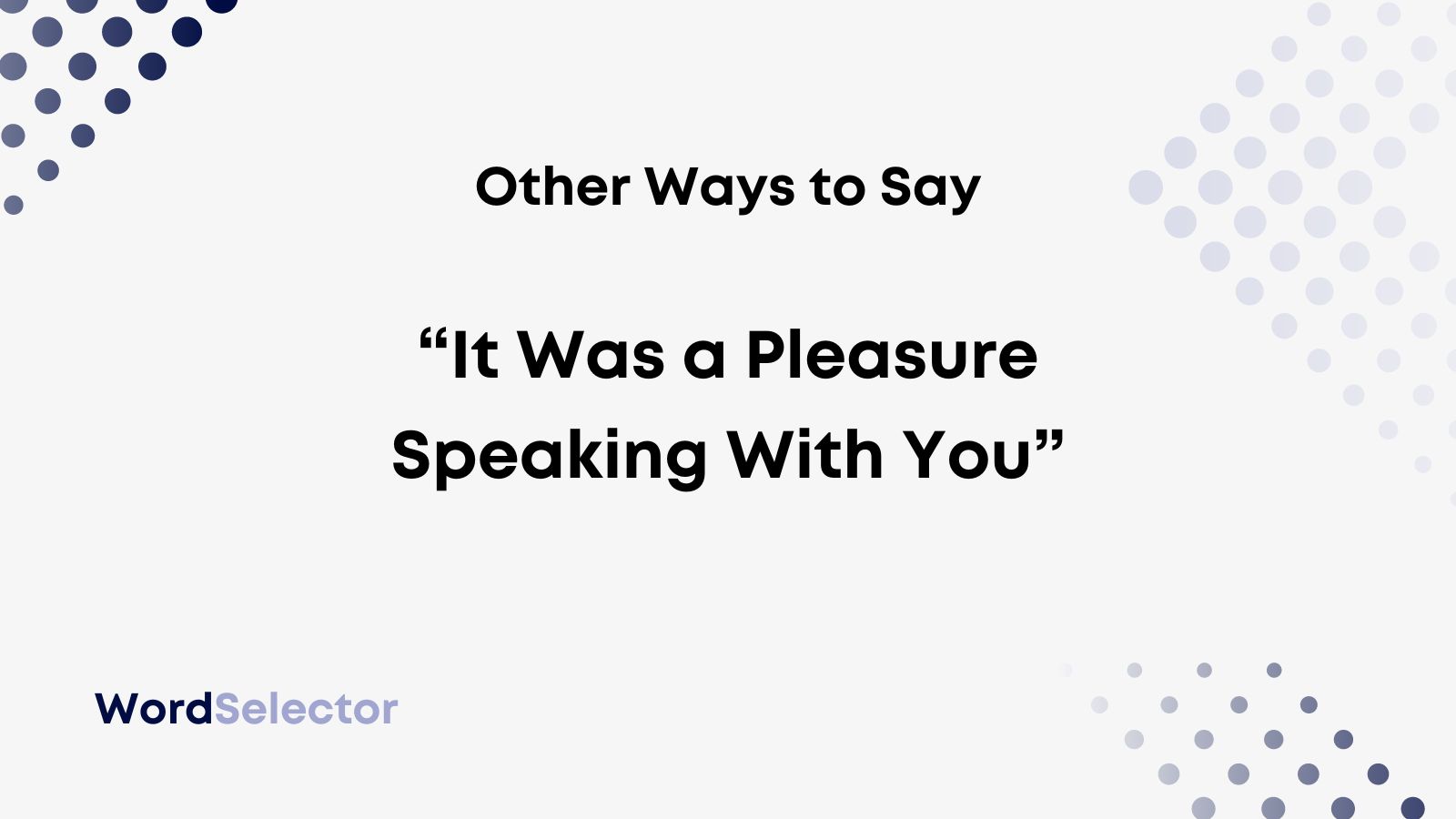So, you’re sending an email to let someone know you enjoyed speaking to them. Well, “it was a pleasure speaking with you” is a great start.
However, there are other alternatives. It’s worth looking into some options, so this article will explain some of the best synonyms available.
Other Ways to Say “It Was a Pleasure Speaking With You”
- I’m glad we had this conversation
- Always nice to chat!
- It’s nice that we got to have this meeting
- I hope you enjoyed talking to me as much as I did to you
- Lovely to speak with you
- I’m pleased we got to speak about this
- I’m very happy about our conversation
- Nice of you to pop in and have a chat
- That was a very good chat
- Thanks for the conversation
- I hope we can speak again soon
KEY TAKEAWAYS
- “It was a pleasure speaking with you” is an excellent phrase in formal writing.
- You could also say “I’m glad we had this conversation,” if you want a formal synonym.
- Try “always nice to chat!” as a more conversational option in your writing.
As you can see, there are certainly plenty of suitable synonyms. Keep reading through this article to learn more about them and how they work in different situations.
Also, you may be interested to learn more about the phrase “it was a pleasure speaking with you.” The final section will talk about whether it’s correct and how to use it.
I’m Glad We Had This Conversation (Formal)
“I’m glad we had this conversation” is a good example of another way to say “it was a pleasure speaking with you.” It’s a very formal synonym, making it useful in most written contexts.
You should try it when emailing your boss about workplace problems. If you set up a meeting to discuss issues, a phrase like this generally shows you’re happy with the result. It suggests that things are moving in the right direction for you.
We recommend using “I’m glad we had this conversation” and “it was a pleasure speaking with you” in similar contexts. Both are useful as professional synonyms. So, you can choose between the two to keep your formal emails interesting.
Check these examples out to help you with it:
Dear Hammond,
I’m glad we had this conversation. It was great to hear you were so accepting of our ideas to fix the issues.
Kindest regards,
Jackson
I’m glad we had this conversation, Michael. So now we don’t have to worry about any overlap.
Always Nice to Chat! (Informal)
“Always nice to chat!” is a great informal synonym. It’s an exclamation that suggests you had a great time talking to someone.
We recommend using this conversational phrase when speaking with friends you haven’t seen in a long time. It shows that you appreciate catching up with them and learning about their life.
You can also use it when setting up informal meetings with coworkers you’re close to. It suggests you enjoyed your time together outside of work.
We don’t recommend using “always nice to chat!” in formal settings, though. It is strictly for friendly contexts. You should generally stick with “it was a pleasure speaking with you” professionally.
Here are a few examples to make sense of it:
It’s always nice to chat, Philip! Thanks for offering to pay for the dinner as well.
Always nice to chat! Let me know if there’s anything else you want to speak about another time.
Is It Correct to Say “It Was a Pleasure Speaking With You”?
It is correct to say “it was a pleasure speaking with you.” It’s great as a formal way to show that you enjoyed meeting with someone.
It works best in business emails when you’ve had a good discussion with a client. You should try sending it in your next email since it shows someone how much you enjoyed your meeting or conversation.
Here are some other variations you can use to mix things up:
- It was great speaking with you today
- It was a pleasure talking to you
- It was nice talking to you
You may also notice that some of the variations say “speaking with,” and others say “talking to.” Both are correct.
“Speak” is a more formal way to show that you have a conversation with someone. “With” accompanies it to highlight the connection.
“Talk” is slightly more informal. “To” is the prepositional choice as it shows that you’re directing a conversation at someone (even if they don’t say much back).
You should bookmark this page to remind yourself of the best synonyms to use! That way, you’ll always have a few ready to go when needed.

